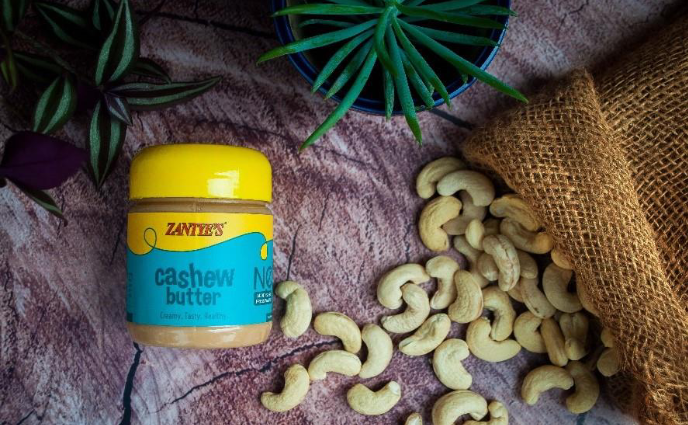Five Nut Butters That Are Not Peanut Butter!
Published On 26/12/2022

There aren’t many snacks that are known for being tasty and healthy at the same time. But there’s one that does fulfill these requirements almost always- peanut butter! Anything involving this nut butter, or just a spoonful of it alone, is enough to satisfy cravings. And yet, not everybody can enjoy this healthy snack as many are allergic, or some just don't find the flavour to their taste. However, there’s no need to get disappointed, for if you’re one of these people, we have got you covered with aleternative nut butters!
Here are five of the yummiest alternative nut butters that will take care of your healthy snacking:
Cashew Butter
Due to their comparable textures, cashew butter and peanut butter make a tasty alternative for spreading or baking. Additionally, it’s a fantastic source of magnesium, a mineral necessary for controlling blood pressure and blood sugar. It may assist adults in achieving the recommended Daily Value (DV) because it offers 20% of the Daily Value (DV) in a two tablespoon (32-gram) serving.
With 5.6 grammes of protein in the same two tablespoons (32-gram), it has slightly less protein than peanut butter in terms of macronutrient content. Although there is little data on cashews’ health advantages, one study indicated that eating 28–64 grammes of cashews daily reduced levels of total and LDL (bad) cholesterol compared to the control group. Also, here’s a post on some amazing vegan desserts you can make using cashew butter.
Pistachio Butter
Pistachio butter, a nut butter produced from pistachios, is a delicious substitute to peanut butter and a quirky twist on the more traditional spread. Rich and creamy with a somewhat sweet undertone, the flavour brings a freshness to the taste palette. For those who have particular nut allergies, in this case peanut allergies, it acts as a fantastic substitute. It can be used as a topping for pancakes, swirled into smoothies, or spread over toast with strawberries to provide flavour and protein to a variety of recipes.
Pistachio butter stands out amongst all the other nut butter due to its yellow-green hue, making it the perfect garnish for your favourite desserts. You could spread it on toast or waffles, smear it on pancakes, or even add a spoonful to your bowl of yoghurt as a tasty way to serve it. Oh, and pistachios come with a whole lot of nutrition and health benefits apart from just being tasty!
Almond Butter
Roasted almonds are used to make almond butter. Since some brands remove the skins to produce a smoother texture. It has roughly the same usage and texture as peanut butter, and its nutritional content is comparable. As a result, it works as a 1:1 replacement in a majority of recipes. When utilised in baked goods, almond butter may, however, change the final result in terms of the flavour profile.
Additionally, in terms of good fat content, almond butter has more mono and polyunsaturated fatty acids than peanut butter! Alomnds are especially beneficial for women. Read here to know why! It also contains a lot of fiber, which helps you feel fuller for a long period of time. Like most butters, it has a low glycemic index, thereby helping in preventing blood sugar surge. Switching to almond butter also does not mean you are compromising on taste, as it is quiet a tasty snack! So, what are you waiting for? Go ahead and give this nut butter a try.
Hazelnut Butter
Less processed hazelnut butters work well as a healthy alternative to peanut butter, unlike Nutella which is high in sugar and unhealthy fats. Hazelnut butter is created from ground and roasted hazelnuts, and it may also have flavour-enhancing chocolate additions. However, it's primarily used in desserts and other sweet foods, much like Nutella. The profile of monounsaturated fatty acids in hazelnuts is high. In fact, they contain a particularly high amount of omega-9 fatty acids, which are good for heart health and are the second-richest source of monounsaturated fatty acids among nuts.
Additionally, according to studies, eating 30-70 grammes of hazelnuts daily may significantly lower levels of LDL (bad) and total cholesterol. Magnesium, calcium, manganese, iron, copper, and zinc are also abundant in them. Additionally, they are thought to be antioxidant-rich because to their high vitamin E concentration and phenolic compounds, which may have anti-inflammatory properties.
Walnut Butter
Walnut butter is spreadable and has a nutty flavor similar to peanut butter. It offers a variety of advantageous elements, such as dietary fiber and good fats like omega-3 and omega-6 polyunsaturated fatty acids. In fact, among all tree nuts, walnuts have the highest omega-3 to omega-6 ratio. According to research, eating 21–75 grammes of walnuts daily may lower blood cholesterol levels and enhance blood vessel function, which may minimise the risk of heart disease. This is because walnuts have a high omega-3 fatty acid profile, a class of heart-healthy fats. Walnut butter can be used in the same ways as peanut butter, on toast, in smoothies, and on fruit.
Well then, no regrets for being unable to have peanut butter, right? Try all of these great alternative nut butters by heading over to the one-stop for the yummiest nuts- Zantye’s! Here’s some extra info about health benefits of nuts. Oh, and did we forget to tell you, we also have some amazing cashew butter in store for you in our online store.
References:
https://www.healthline.com/nutrition/peanut-butter-substitute#tree-nut
